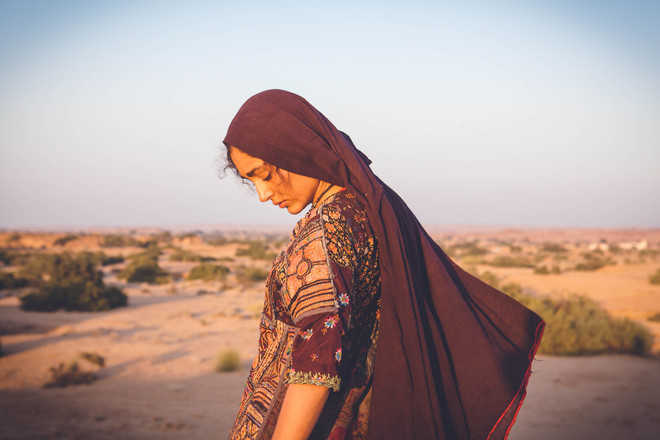
Golshifteh Farahani in a still from The Song of the Scorpion.
Saibal Chatterjee
How tough is it to get funds for your kind of films? What are the strategies that you need?
“Commercial viability”, “strategy” — I’ve never thought of cinema in those terms. I try and be as honest as possible to one question in all my work: how can I live without being ashamed of myself in our world today? When I meet a producer, that’s the question I bring to the fore. And all the producers I’ve worked with have whole-heartedly joined me in my experiments to answer this question. We try to be worthy of this quest. This might not sound humble at all, but it’s what my producers and I believe in: as much as commercial viability, we seek in our work to be viable to the fullness of life.
You set Ekti Nadir Naam in Bengal, Qissa in Punjab and The Song of Scorpions in Rajasthan. Is this wide cultural palette a conscious choice?
I am very uneasy with the way we’ve chosen to recognise ourselves as citizens of one country, members of one community, defined by the narrow notions of gender. We seem now not only to reject but also actively resent being thought of as belonging to the human race. That saddens me profoundly. In my cinema, I try to celebrate all that we are. If not in the world, at least in our imagination, we can acknowledge, honour, learn from each other and, together, live life creatively and in peace.
Is the fable-like mystical quality of Qissa also an element in The Song of Scorpions?
The questions are the same, but, perhaps, I’m being able to articulate these better as I grow from film to film. What is truth? What is the body or mind’s relationship to the other, to water, to fire, to wind, to the earth? And, then, this question, which for me finds its fullest expression in The Song of Scorpions: given the world of violence we live in, every moment of our life we are breathing in some kind of poison. The critical question for all of us today is: when we breathe out, do we breathe out the same poison or do we, instead, breathe out a song?
What explains your incredible rapport with Irrfan Khan?
Perhaps it’s something as simple as that we never gossip. When we meet, we only talk about our work. And, it’s obvious to each of us, that we’ll fight every fear and limit to encourage and help each to go for the furthest reaches of our imagination.
What does Golshifteh Farahani bring to The Song of Scorpions?
Golshifteh lives in exile. She lives in the pain of separation from her country, Iran, and her family. However, instead of allowing this pain to embitter her, she followed it to the end where it showed her that, finally, we are all strangers to ourselves. She has taken this insight to fearlessly open herself to the other possibilities within her. This is what makes her the exciting, multi-dimensional actress she is. Golshifteh’s journey as a person and artist in many ways mirrors Nooran, the female protagonist’s journey in the film: Nooran, too, has to journey into an exile from her own body and identity, fight her primal instinct to seek vengeance and, finally, learn to celebrate herself.
Waheeda Rehman has come out of retirement to play a role in the film. Was it difficult to convince her?
It’s a role that holds my deepest beliefs and hopes. Obviously, I needed an actress whose very presence, whose every gesture would give breath to this secret source of the film. Once I started thinking of the film cast, Waheedaji kept recurring in my thoughts. The gentleness and insight with which she looks at you were very important to me — she’s like the incarnation of a song of yearning that we all carry within ourselves. So, I approached her for the role, but was aware that she had been saying ‘no’ to everything for the last eight years. Luckily, she had seen Qissa and simply asked me to tell her about the role. I told her it was about a woman who, when she sang, could bring flowers to bloom in a desert. And that was enough! Her imagination immediately understood the role and she said, “Yes”!



























